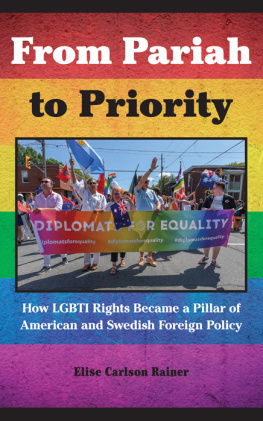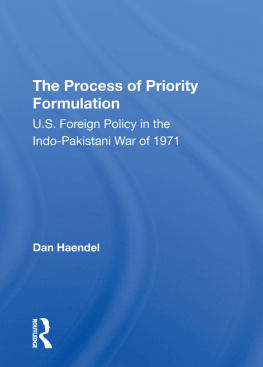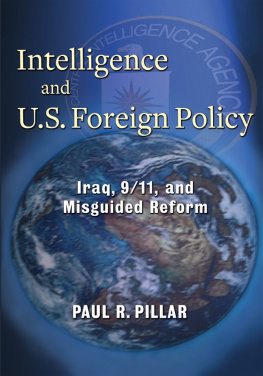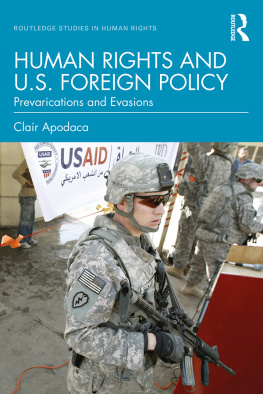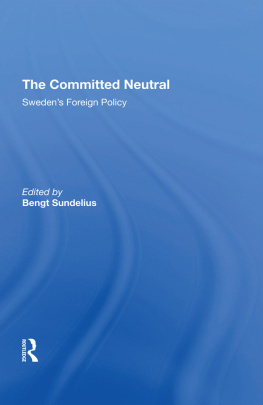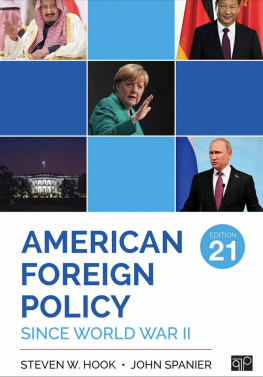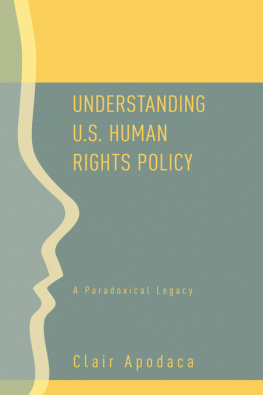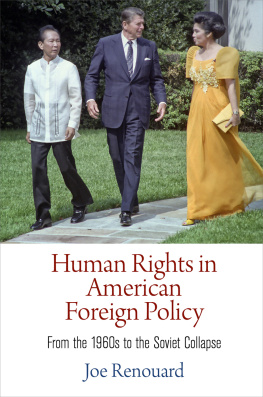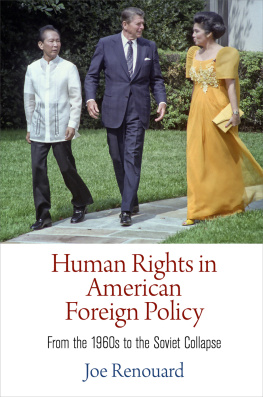From Pariah
to PrioritySUNY series, Studies in Human Rights
Suzy Lee and Alexandria S. Moore, editors
SUNY series in Queer Politics and Cultures
Cynthia Burack and Jyl J. Josephson, editors
From Pariah
to Priority
How LGBTI Rights Became a Pillar of
American and Swedish Foreign Policy
Elise Carlson Rainer
Published by State University of New York Press, Albany
2021 State University of New York
All rights reserved
Printed in the United States of America
No part of this book may be used or reproduced in any manner whatsoever without written permission. No part of this book may be stored in a retrieval system or transmitted in any form or by any means including electronic, electrostatic, magnetic tape, mechanical, photocopying, recording, or otherwise without the prior permission in writing of the publisher.
For information, contact State University of New York Press, Albany, NY
www.sunypress.edu
Library of Congress Cataloging-in-Publication Data
Name: Rainer, Elise Carlson, author.
Title: From pariah to priority : how LGBTI rights became a pillar of American and Swedish foreign policy / Elise Carlson Rainer.
Description: Albany : State University of New York Press, [2021] | Series: SUNY series in queer politics and cultures | Includes bibliographical references and index.
Identifiers: LCCN 2021023969 | ISBN 9781438485799 (hardcover : alk. paper) | ISBN 9781438485805 (ebook)
Subjects: LCSH: Sexual minoritiesCivil rightsUnited StatesCase studies. | Sexual minoritiesCivil rightsSwedenCase studies. | Sexual minoritiesCivil rightsInternational cooperationCase studies. | Human rightsGovernment policySwedenCase studies. | Human rightsGovernment policyUnited StatesCase studies. | Human rightsInternational cooperationCase studies. | SwedenForeign relationsCase studies. | United StatesForeign relationsCase studies.
Classification: LCC HQ73.73.U6 R35 2021 | DDC 306.760973dc23
LC record available at https://lccn.loc.gov/2021023969
10 9 8 7 6 5 4 3 2 1
I dedicate this book to my children, Tristan and Sonja Rainer,
as well as to my father, Paul Carlson,
who taught me how to love others.
Thank you to my Swedish spouse, Stefan Rainer,
who has been my love and support for nearly two decades.
Contents
Acknowledgments
I would like to thank the following individuals for their contribution to this research, foreign policy leadership, and/or decades of human rights advocacy: Randy Berry, Daniel Baer, Michael Posner, Daniel Mahanty, Mark Bromley, Todd Larson, Samantha Power, Anne-Marie Slaughter, Anthony Adero, Jessica Stern, Amie Bishop, Katie Hultquist, Julie Dorf, Angeline Jackson, Sren Juvas, Maria Sjdin, Birgitta Ohlsson, Barbro Westerholm, and Helena Westin. Thank you to my brilliant diplomat colleague friends for their wisdom over the years: Saba Ghori, Adrienne Bory, Katie McLain, Karen Chen, Pamela Erickson, Anish Goel, Jessica Lieberman, Aaron Spencer, Dan Mahanty, Stacey May, Deborah Jones, and Hannah Rosenthal. While many others remain anonymous, I am grateful for the important work of many leaders and activists working around the globe, at times in great physical danger, towards a more just and equal world.
I am grateful for the encouragement, support and expertise from many people during this book project. Thank you to SUNY senior acquisitions editor Michael Rinella and SUNY Queer Politics and Cultures editor Cynthia Burack for supporting the publication of this book. Phillip Ayoub, thank you for inviting me to conferences and providing your depth of expertise in global LGBTI rights. I am in gratitude to Sabine Lang, Christine Ingebritsen, Dan Chirot, for supporting my research and shaping me as a scholar, as well as Karam Dana at the University of Washington for your mentorship. Thank you to the astute editing work of Kimberly Alecia Singletary from Humanities First, and Sean Butorac at the University of Washington. Thank you to my wonderful research assistants, Sacha Moufarrej and Hope Dorris; I could not have completed the book without your assistance. I am grateful to the stellar network of researchers at the University of Gothenburg Gender and Diplomacy GenDip Research Network, especially Ann Towns, Birgitta Niklasson, Susan Harris Rimmer, and Elise Stephenson. Thank you to Stefano Guzzini, and my cohort in the Department of Peace and Conflict Research at Uppsala University. Nigel Boyle at Pitzer College, whose support helped me earn a Fulbright Fellowship to Sweden, and whose mentorship shaped my diplomatic career. I want to acknowledge a host of colleagues, friends, and peers who graciously supported me personally and professionally to complete this research over the years: Allegra Wiborg, Manuel Guzman, Indra Ekmanis, Dustin Welch, Willa Jeffers, Matthew Crosston, Dylan OConnor, Lisbet Rodriguez-Perez, Shellwyn Badger, Justin Loustau, Susan Dicklitch-Nelson, Indira Rahman, and David Paternotte.
Conducting international research is costly, and I am grateful for the financial support of multiple organizations to complete this book project: the Swedish Womens Education Association of San Francisco, whose funding enabled original field work in Sweden, and the University of Washingtons (UW) European Union Center of Excellence for funding my research to the European Union. Thank you as well to the UW Graduate School and the UW Jackson School of International Studies for travel funds for field work. I also thank the Swedish Womens Education Association (SWEA) of Portland, the American Public University Faculty Research Grant, and the University of Washingtons Department of Scandinavian Studies Synnove Fielding Fund for Excellence for support in the final research, writing, and editing of the manuscript.
Preface
In 2009, on a bright December afternoon in Washington, DC, I sat in Georgetown Universitys Gaston Hall auditorium waiting for my boss, Secretary of State Hillary Clinton, to deliver her Human Rights in the Twenty-First Century speech. This speech was Clintons first significant public articulation of the Obama administrations vision to reshape the United States human rights foreign policy. Her policy priorities, and how she would revitalize US engagement in human rights foreign affairs, were not yet known to the wider public.
In 2009, LGBTI rights was not a pillar of American foreign policy. At the time, homosexuality was illegal in more than seventy countries and punishable by death in nine nations. In the early 2000s, only a handful of Northern European nations addressed LGBTI rights in international affairs.
State Department career personel are familiar with the transition to new administrations and how new leadership can potentially invigorate or, conversely, deprioritize and disengage, or do nothing at all to change human rights foreign policy priorities.
As a US diplomat with human rights as my central focus, I worked on human rights policy and programs across North Africa and the Gulf from 2005 to 2016. Over the years, I met with human rights activists who received protection, both symbolic and logistical, from US embassies. Embassy staff, from entry-level officers to US ambassadors, worked to stop gender-based violence in Jordan, train female lawyers to defend womens rights in Morocco, and conduct dialogue with religious minorities in Egypt, to name a few examples. I worked toward freedom of association in Gulf countries and met with heads of security to advocate for peaceful political participation of ethnic and religious minorities. Six months before the revolution in Tunisia in 2010, I met with journalists and human rights activists in Tunis fighting for a modicum of freedom of expression under the Ben Ali regime. Pulling up his shirt, one man showed me the marks of torture from his governments security forces. I became accustomed to human rights activists showing me the physical signs of abuse they endured under authoritarian regimes.


